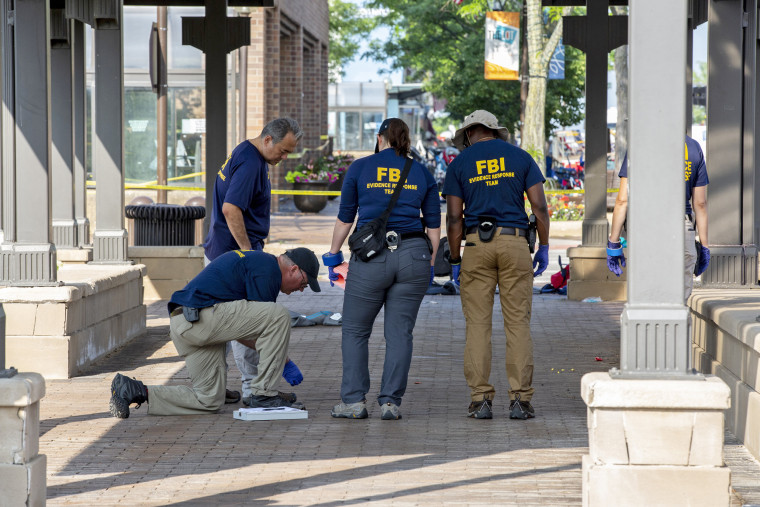WASHINGTON — In the 48 hours since the July Fourth parade shooting in Highland Park, Illinois, that killed seven people, a disturbing portrait has emerged of the man now charged with several counts of first-degree murder.
Those who know Robert “Bobby” E. Crimo III, 21, saw plenty of red flags in his social media presence. The currently available material, however, is likely protected by the First Amendment, and it's hard to find an applicable criminal statute that would apply to disturbing but nonspecific content, experts and former law enforcement officials said.
Chris Covelli, a spokesman for the Lake County Major Crime Task Force, said Tuesday that Crimo attempted suicide in April 2019 and then, family members reported, threatened to “kill everyone" in September 2019. He said that in that September incident, police removed more than a dozen knives from Crimo's home and notified state police, but took no further action because there was no probable cause for a criminal charge.
There were no convictions that would have prevented Crimo from buying guns and he legally obtained his weapons. Just months after the September 2019 incident, the Chicago Sun-Times reported, Crimo’s father sponsored his son's December 2019 gun permit in the state of Illinois, which requires a parent or guardian to co-sign for those under 21. Crimo passed four separate background checks, one in June 2020, two in July 2020 and one in September 2021, state police said, according to the Sun-Times.
Illinois is one of 13 states where the point of contact for licensed firearms dealers running background checks on buyers under the National Instant Criminal Background Check System is state authorities, rather than the FBI. So unlike in the 2015 church massacre in Charleston, South Carolina, it won't be a clerical error by the FBI in a system a federal judge described as "hopelessly stuck in 1995" that allowed the alleged gunman to make a purchase that should have been stopped. And unlike the 2018 school massacre in Parkland, Florida, there's no indication so far that someone called in a tip to the FBI that wasn't followed up on or forwarded to the proper authorities.
Even with his disturbing social media presence, there's no indication that Crimo should've been on the FBI's radar.
The FBI, relative to the country, is a small organization with roughly 13,000 special agents, and local law enforcement officials have far more contact with the general public. Absent evidence of a specific criminal plan or prior criminal convictions, former FBI officials bristle at the suggestion that there's something the bureau could have or should have done to prevent disturbed individuals from carrying out attacks.
“I don’t know of any authority they have to arrest somebody for being weird or armed,” a former FBI official told NBC News. “The bottom line is you have a right to be weird and armed.”
Stopping a shooting like the one in Highland Park is not just tough, but "impossible" for the bureau, the former official said, adding that it was "just outlandishly insane" to think that the FBI had anywhere near the manpower it would require to review every disturbing online post.
“How would you like them to do it? You can’t sit on TikTok all day and watch crazy-ass videos. They’ve got other work to do,” the former official said.
Former FBI official Peter Strzok called it a “pretty daunting problem.”
“There is far more material than there are federal law enforcement officers, state and local law enforcement officers who are able to review that,” he said on MSNBC’s "Deadline: White House" on Tuesday. He noted that even if they had the manpower, that sort of invasive governmental look into online activity wouldn’t be consistent with the First Amendment.
“All of this discussion is talking about treating the symptoms,” Strzok said. “Nobody should be surprised and nobody should think it is hard to do something that this suspect did. We have made it easier in the United States to buy a weapon than it is to go to your local animal shelter and adopt a pet.”
He concurred that preventing disturbed individuals from obtaining weapons is one of the best points of intervention, but that there's often not an applicable charge to pin on a disturbed individual that could prevent that person from buying a weapon in the future.
Law enforcement can talk to the family members, urge them to get mental health treatment for the person or to get the guns out of the house. They can document. But if there's not a crime, police officers can't be blamed for not making an arrest, the official said.
There are certainly multi-pronged approaches to off-ramping potential mass shooters. But even in cases where parents aren't proactively helping their children obtain weapons, there aren’t incentives for parents to take the type of action that would prevent a troubled young adult from buying guns: Few families want to saddle their offspring with a criminal record that would impede them for the rest of their lives.
While the FBI isn't the front-line responder, it does frequently come into contact with disturbed individuals when there's a more explicit threat and the bureau gets a specific tip.
As NBC News reported in May, a New Mexico man convinced the FBI that he was not a threat more than a year before he killed two high school students and himself.
Katherine Schweit, a former FBI special agent who headed an active shooter program, noted the difficulty of intervening and opening up a criminal investigation in those cases.
"You have to make sure that if you’re going to ... invade somebody’s constitutional rights to freedom of association, to freedom of speech, you better have a very good idea that there’s some specific thing that somebody really means they’re going to do and it’s not just rhetoric," she said.

